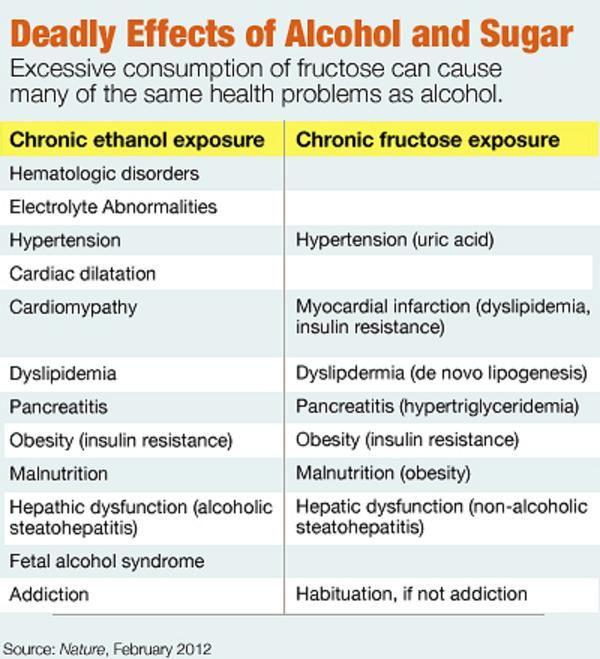Researchers: Sugar Kills Like Alcohol and Tobacco, Should be Regulated

Sugar should be government-regulated like alcohol and tobacco, due to its ever-expanding use in processed foods poses a significant threat to public health, a team of researchers said in an opinion article published in the Feb. 4 issue of nature magazine.
Sugar is generally viewed as nothing more than “empty calories”, but researchers from the University of California, San Francisco said there is mounting scientific evidence showing that “fructose can trigger processes that lead to liver toxicity and a host of other chronic diseases”.
Researchers Robert Lustig, Laura Schmidt and Claire Brindis said that if international authorities were “truly concerned about public health” they need to consider limiting fructose and sucrose.
The level of sugar consumed by most Americans is capable of changing metabolism, raising blood pressure, and critically changing hormone signaling to significantly damage the liver. These hazardous health risks associated with sugar essentially reflect the effects of drinking too much alcohol, which researchers noted is produced by the distillation of sugar.
Previous studies have also associated sugar consumption to cancer and cognitive decline.
The researchers said taxes could be imposed on processed foods that have added sugar to curb the chronic disease rate.
"Consequently, we propose adding taxes to processed foods that contain any form of added sugars," wrote the researchers. "This would include sweetened fizzy drinks (soda), other sugar-sweetened beverages (for example, juice, sports drinks and chocolate milk) and sugared cereal … Another option would be to limit sales during school operation, or to designate an age limit (such as 17) for the purchase of drinks with added sugar, particularly soda."
Researchers also proposed other models for addressing the sugar problem, like controlling access and tightening licensing requirements on vending machines and snack bars that sell high sugar products in public places, schools and workplaces.
Worldwide consumption has tripled in the last half decade and is considered as the main cause of the obesity epidemic, and the United Nations have indicated that for the first time since human history that chronic diseases like heart disease, cancer and diabetes currently pose a greater health burden around the world than infectious diseases, contributing to 35 million deaths per year.
"There are now 30% more people who are obese than who are undernourished," said the UCSF scientists. "Economic development means that the populations of low- and middle-income countries are living longer, and therefore are more susceptible to non-communicable diseases; 80% of deaths attributable to them occur in these countries."
Lustig, a professor of pediatrics, in the division of endocrinology at the UCSF Benioff Children’s Hospital said in a statement released Wednesday that if the public continues to think that sugar is just empty calories, there will be “no chance” in solving these chronic diseases.
“There are good calories and bad calories, just as there are good fats and bad fats, good amino acids and bad amino acids, good carbohydrates and bad carbohydrates,” Lustig said. “But sugar is toxic beyond its calories.”
Researchers acknowledged that there are challenges in limiting sugar consumption.
“We recognize that there are cultural and celebratory aspects of sugar,” said Brindis, director of UCSF’s Philip R. Lee Institute for Health Policy Studies in a statement. “Changing these patterns is very complicated.”
Brindis said that effective interventions is impossible if it is based solely on individual change, but environmental and community-wide solutions, like the regulation of tobacco and alcohol, increases the chances of success.
The public must also be better informed about the emerging science on the toxicity of sugar, the researchers said.
“There is an enormous gap between what we know from science and what we practice in reality,” said Schmidt, professor of health policy at UCSF’s IHPS and co-chair of UCSF’s Clinical and Translational Science Institute’s Community Engagement and Health Policy Program.
“In order to move the health needle, this issue needs to be recognized as a fundamental concern at the global level,” Schmidt said.
Researchers argued that sugar has become a menace to public health because it is impossible to avoid in modern society.
"Evolutionarily, sugar was available to our ancestors as fruit for only a few months a year (at harvest time), or as honey, which was guarded by bees. But in recent years, sugar has been added to nearly all processed foods, limiting consumer choice. Nature made sugar hard to get; man made it easy," the scientists explained.
“We’re not talking prohibition,” Schmidt said. “What we want is to actually increase people’s choices by making foods that aren’t loaded with sugar comparatively easier and cheaper to get.”
UCSF Video: The Toxic Truth About Sugar with Robert Lustig, MD



























